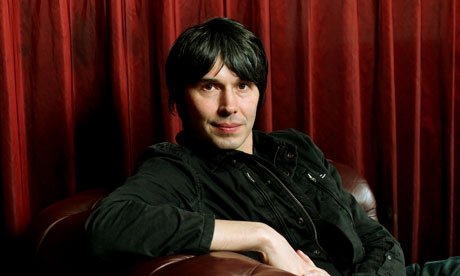
Shaun Keaveny (6 Music) | iPlayer
Moral Maze (R4) | iPlayer
My Teenage Diary (R4) | iPlayer
The Godfather of Ulster Punk (R4) | iPlayer
Last week people had a lot of explaining to do. Analogies and metaphors were flung around like particles in the Large Hadron Collider (Do you see? Do you see?) as experts everywhere tried to clarify a) Higgs boson and b) Libor.
My favourite explanation of the former came from Brian Cox, talking to Shaun Keaveny for 6 Music's breakfast show. Physics's one and only pretty boy was watching the announcement of the results from Cern live on the web. Had a Higgs-like particle been discovered, wondered Shaun? "It's 99.999% sure," said Cox. "Which actually, in particle physics, is only just sure enough."
Whereas other explanations of the Higgs boson seem to have relied mostly on ping-pong balls and bags of sugar, Cox just used his brain, connected to his mouth. "It's one of the great moments in the history of science," he said, highlighting the astonishing truth that, 50 years ago, Higgs guessed that spooky, unseen fields exploded into existence, "condensed out of the vacuum after the big bang", and that when particles interact with these fields, they gain mass. "And as of 10 minutes ago, we've just worked out that it's true," goggled Cox.
Cox is a great science communicator because – on radio, at least – he doesn't try to make things too simple. He makes us wonder at the complexity of physics and is very careful about results. I remember hearing him talk on 6 Music about another recent discovery that seemed to indicate that some particles could travel faster than the speed of light. He thought it was far more likely that the results were out of whack. Which they were.
In particle physics everything is teeny-tiny and exceptionally precise. In Moral Maze it's all sweeping judgments and airy dismissals. Bad bankers are an indication of a corrupt society. Capitalism is out of control. It can make you feel hopeless when it doesn't make you laugh. Melanie Phillips cites the rise of individualism and the decline of societal morals as the root causes of everything. Perhaps she's right. I prefer Matthew Taylor though, who seems to get to the point more directly ("Well, is there a moral code that could allow both investment banking to exist and stop people behaving badly?"). And I do love Michael Buerk's introductions. He uses some beautiful phrases: "Barrow-boy, Bollinger-fuelled chiselling"; "the Captain Mainwaring-style fustiness of banking's past."
Writer Caitlin Moran, in her thoroughly entertaining My Teenage Diary for Radio 4, wasn't one for beautiful phrases. The first entry she read out was: "Pie tomorrow." The second, on the following day: "Pie." Her diary, which spanned from age 10 to around 20, was hilarious and touching, revealing the daily difficulties of being the oldest child in a big family that wasn't able to cope with itself. The Moran kids didn't go to school but entertained themselves with games, such as Throwing Mud at the House. A 10-year-old Caitlin put up curtain rails, made spag bol for the rest of the kids and got excited about buying lightbulbs and Blu-Tack. The studio audience didn't know whether to laugh or "aw" so instead did both, a strange noise.
Lots of strange noises in The Godfather of Ulster Punk, about the Belfast label manager and record shop owner Terri Hooley. Producer Conor Garrett shoehorned in music, news programmes and live sound to make a properly lively listen. And so evocative! Presenter Alan Dein and Hooley himself described a time in the 70s when the ring of steel around Belfast meant that in the evenings there were only British squaddies, RUC men and punks in the centre of the city: "What a playground!" enthused Dein. "It was a teenager's dream." A different slant on the Troubles.

